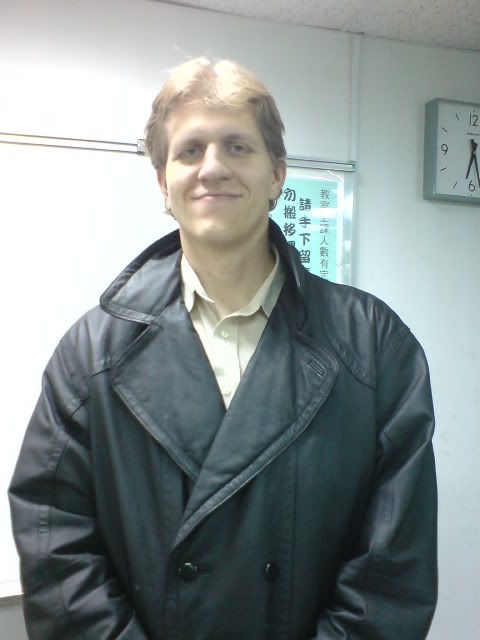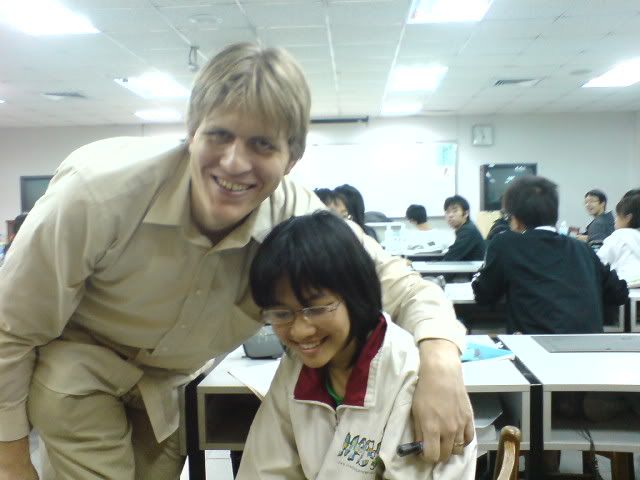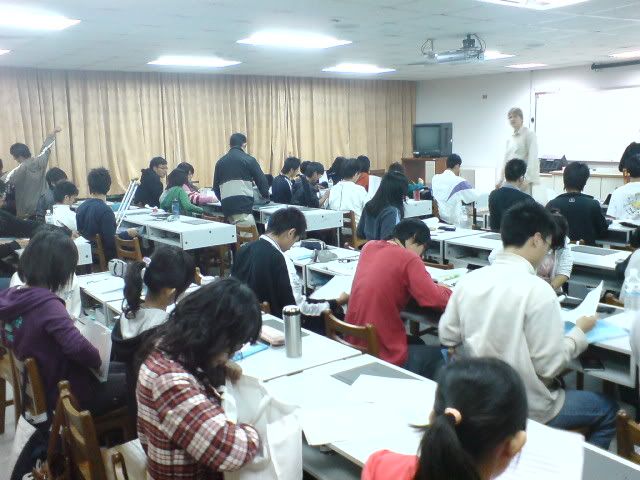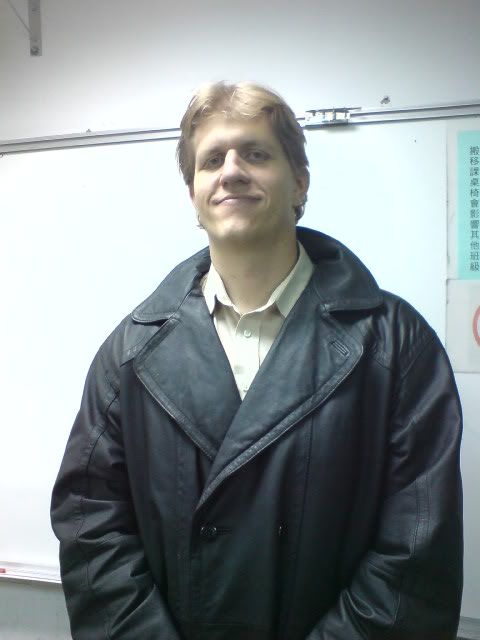By Wei-Fan Yang
In order to take pictures of Sean Allan I disguised myself as a freshman and visited one of his classes. Here I “witnessed” his magic: he captures students’ attention and also tries hard to assist them in memorizing new vocabulary. He never lost patience when students could not answer questions in English, and his lectures kept me from many common writing errors! As a teacher he is responsible, and as a friend he always wins a laugh and a smile. Meet our next interviewee:
Sean Allan.
 Q1: What was your best or worst experience in Taipei?
Q1: What was your best or worst experience in Taipei?
When I first arrived in Taipei, I brought too much luggage. Every time the bus or the cab dropped me off I would struggle to move four large bags. Most of the people around me just ignored me and my struggle. Eventually, on two different occasions a woman stopped to help me. The first time it was a woman in her seventies; the second time a woman in her late forties. This is both my worst and best experience: I witnessed both the coldness of the big city and the kindness of everyday people-- or at least the kindness of everyday women.
Q2: What are your favorite movies and books?
I have hundreds of favorite movies and books. If I had to name some movies, I would say Billy Wilder's Double Indemnity, anything by John Cassavetes, Bela Tarr's Werckmeister Harmonies, and Wong Kar-Wai's Fallen Angels. Do I sound pretentious enough? I was very lucky to see several films by the late Edward Yang at the 2007 Golden Horse film festival. He was a major world filmmaker. I attended a screening of A Brighter Summer Day even though it didn't have English subtitles (I saw it with English subtitles before). It's amazing how Yang used the influence of 1950s American teen movies and was able to make such moving insights into the nature of childhood, machismo, violence, and Taiwan's history. As to books, I have probably read Denis Johnson’s
Jesus’ Son more than any other. The book captures the mood of 1970s America, and it looks at the elective affinities between drug addiction and spiritual torment.
 Q3: What kinds of music do you like?
Q3: What kinds of music do you like?I listen to different kinds of music. As a scholar of the late 20th century masculinity I listen to rap music of the early 1990s. (Really? Can you rap now?) No. Listening to rap and rapping are different things. I like anything coming out of the blues and jazz traditions. Of course, Jay Chou is the greatest musician ever.
Q4: Talk about your experience of learning Chinese. Did you face any difficulties?
It is very difficult to learn Chinese. I have some vocabulary, but my ability to listen and understand is still very poor. Because of my teaching schedule, I cannot take a regular class. I try to study on my own, and that is hit-and-miss. It is hard to practice listening and speaking skills; my roommate is very helpful, but he is also very busy.
 Q5: Why did you choose film studies and English as your major field?
Q5: Why did you choose film studies and English as your major field?My field is American literature and culture. In particular, I am interested in how contemporary American art is interested in representations of male violence and male emotional trauma. Why do we have such an interest in violent men now, and how is it different from the interest in juvenile delinquents in the 1950s and 1960s? I think literature still has a lot to say about the way we live now, but I also think I need to give attention to art forms that people are more likely to consume--namely, films and popular culture. Also, because I'm interested in contemporary literature, I feel that an interest in film is necessary; film and literature influence each other.
My master's degree is in English, with an emphasis on cinema studies, particularly Asian film. I don't know that I can explain why I am interested in film studies. I suppose I like the fact that film explores visual spectacle and visual poetry, yet it also provides the spiritual insights of good literature.
 Q6: What is your attitude about teaching English for non-native speakers ?
Q6: What is your attitude about teaching English for non-native speakers ?
I have a positive attitude. I teach the course as I would teach a course fornative speakers; I adjust simply by anticipating and determining students' special needs. The only significant difference is the attention needed for vocabulary. The great challenge is the variation in speaking and listening skills among the students. They can write nearly as well as their native speaker counterparts.
 Q7: Could you give students some suggestions for learning English?
Q7: Could you give students some suggestions for learning English?
Generally students should pay more attention to speaking and listening. There are a lot of basic resources like English language television and English language radio on the internet now, which can help students improve their listening and speaking skills.
Q8: What courses would you like to teach?
A film survey. I would just show the movies and talk about how much I like them and why I like them, and I believe the class would be fun. As to literature, I would like to teach contemporary American writers or something more specialized.
Q9: What would you like to change?
(After thinking a minute) I have no idea. If I could change one thing, I would give someone else the ability to change one thing. Well, I think I respond to my situation rather than dream about how I could change. Sometimes you will imagine yourself being more social, being a better speaker, being better looking, or being smarter, but it is just a private little fantasy, you know.
About Sean Allan
Heights: 6 feet 5 inches
Sign: Aries
Blood type: Unknown
Hair Color: Brown
Favorite Food in Taiwan: Stinky Tofu
Professor Sean Allan received his Ph. D. in English at University of California, Davis. He specializes in American literature and culture, as well as English composition. He teaches Freshman English at NTU now.
沒有留言:
張貼留言